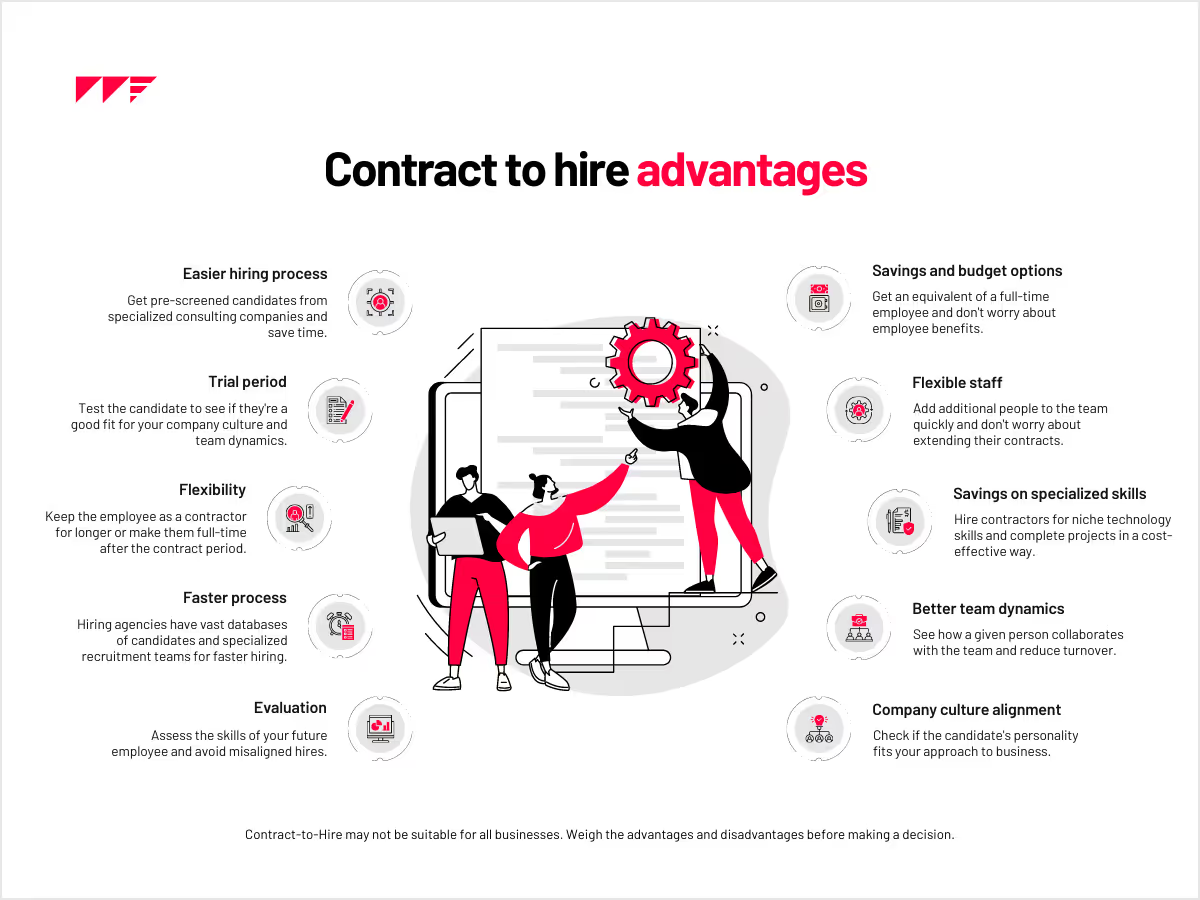Contract to Hire - everything you need to know

Contract-to-hire, meaning an arrangement where employees enter fixed-term contracts with a staffing agency before becoming hired as full-time employees at your company, can be a beneficial recruitment approach for companies prepared to hire contractors. These contractors join your company for a trial period so you can make sure they are the right fit. In other words, you get to verify their qualifications and cultural alignment before committing to a permanent direct hire. The Contract to Hire (CtH) model reduces the risk of bringing the wrong person into your company.
By choosing this recruitment model, you enjoy more flexibility and a much shorter permanent hiring process. Moreover, you won’t have to pay for the benefits an employee receives during this initial period which can be confirmed as probationary. On the other hand, hiring employees this way means you’ll have to pay extra. In addition to the salary, there is a fee for the agency that takes responsibility for this contractor. For most companies, it’s an acceptable cost to save themselves the trouble when a new employee is not cut out for the position.
Read further to understand how contract-to-hire works, how is it different from other types of contracts, what are its advantages, and how to prepare for challenges.
Difference between contract-to-hire vs contract arrangements
Independent contractors are not bound to any company but rather self-employed individuals. People employed on a contract-to-hire basis are usually employees of the staffing agency. That agency is responsible for their payrolls and the benefits they receive. This type of employee typically has different expectations than an independent contractor and often looks for a full-time position. The agency’s role is to connect the right person with the right company.
How does the contract-to-hire process look like?
In the case of a contract-to-hire, the agency is responsible for a big part of the recruitment process. It’s their job to look for appropriate candidates, review their resumes and prepare a shortlist of suitable applicants for the client company. They usually perform introductory interviews to confirm that a given person is a good fit and then connect chosen candidates with the client company for final interviews. For candidates, the agency’s recruiters become talent managers who guide them in their careers. The agency isn’t only looking to fill a position but also trying to set both parties up for success so they can work together again.
Once a candidate is selected and decides to take this opportunity, they begin the employment contract on the agency’s payroll. Depending on the client, the duration of this contract will vary. During this time, the client can assess the employee to see if they have the skills for the job and fit in with the company culture. When the contract with the agency ends, an employee who met or exceeded the expectations will become a full-time employee at the client company and sign a direct-hire agreement. Those who didn’t perform as expected will not be awarded a permanent contract, and the agency will propose another candidate.
Considerations before utilizing contract-to-hire roles
Every company hires employees for their skills and the value they bring to the company. Before you consider the contract-to-hire approach, you have to decide on the tasks and responsibilities of a new hire, just like you would in a standard recruitment process. But skills aren’t everything, as new employees should also be a cultural fit. Determine what kind of person you’re looking for and what their goals at your company should be.
When you’re looking for a full time employee, you should have a long-term plan for them in place. The contract-to-hire candidate should be treated as a permanent employee from day one. They’re not a contractor who comes and leaves after three months. If you want them to join an existing project, ensure there is enough work in the pipeline.
A contract-to-hire employee will require you to look into the CapEx (capital expenditures) and the workforce budget. Remember that after an agreed-upon period, the contract-to-hire person will switch to an FTE. Consider the CtH timeline and revise budgets in both wallets accordingly.
Contract-to-hire advantages
Not all businesses need contract-to-hire positions. Without a doubt, this model has many advantages, but the additional costs aren’t always worth it. Companies that recruit highly paid specialists utilize this model to assess employees before committing to them, but it doesn’t make sense for positions that are lower in cost. That said, let’s explore the major advantages of a contract-to-hire approach.

1. Easier hiring process
Your recruitment team doesn’t have to take care of the whole hiring process. Working with an agency means they will do the legwork for you. All you have to do is send the requirements, budget, and expectations to your partner, and they will come to you with pre-screened candidates. You’ll be responsible for the last stage of the process and choosing the best candidate. Additionally, specialized consulting companies usually have a pipeline of candidates who can be a great fit for your organization, which will significantly reduce the recruitment time, especially for niche roles.
2. Trial period
For many companies, this is the most significant benefit of a contract-to-hire model. Both sides can put to the test if they are a fit before they fully commit. During the contract period, for example a 3-month contract-to-hire arrangement, you get to see if the candidate you chose is actually the person you are looking for. You’ll see if they click with the company culture and how well they work in a team, or how strong their leadership skills are. At the same time, the candidate understands that it’s a “test run,” and they consider if the company offers what they are looking for in an employer.
3. You get more flexibility
When you hire full-time, it’s difficult to change the employment contract, and the employee has more bargaining power. In a contract-to-hire agreement, you get to try out the employee before making a decision to hire them. But even if you can’t reach an agreement after this period or experience unforeseen budget constraints, it’s easier to keep the employee as a contractor for longer than immediately find someone who can replace them. Utilizing a Contract to Hire means following different guidelines and setting different expectations from the start.
4. Faster process
The hiring agencies have vast databases of candidates, including those with niche skills. They also know who is on a job search and who doesn’t want to look for a new position. On top of that, they have specialized recruitment teams and employees dedicated to working with specific roles. For example, one of Maxima’s recruiters focuses on executive-level candidates, so she’s trained to look for different traits in candidates than other recruiters. With specialized knowledge, the hiring process becomes much faster, and candidates are better aligned with your expectations so that you can choose someone sooner.
5. You get to evaluate the candidate
As an employer, you will have more time to assess the skills of your future employee. If the first weeks don’t convince you that it’s the right person, you can extend the contract time without additional risks. Equally so, the candidate gets to see if your company and the position you offer are what they are looking for in their career. This way, you ensure that A-players join your company and avoid the additional costs a misaligned hire generates.
6. Savings and budget options
If your workforce budget is restrained, with contract-to-hire arrangements, you get an equivalent of a full-time employee by utilizing the CapEx budget. Additionally, contract-to-hire employees don’t receive any benefits from your company, as it’s handled by the agency, which is also responsible for employee benefits, healthcare plans, retirement, etc. Contract hires are also usually paid only for the hours they work, so they don’t receive a fixed monthly salary.
7. Flexible staffing
With the contract-to-hire jobs, you don’t have to worry about overstaffing. You get to add additional people to the team more quickly, but if the project ends sooner than expected, you don’t have to extend their contracts. In such a case, it’s the agency’s responsibility to look for another project that suits these employees.
8. Savings on specialized skills
Niche technology skills are hard to find, especially when you need senior talent. The problem grows when such skills are needed for a relatively short time. Finding a full-time employee will be time-consuming and expensive, but a contractor could be a much easier hire. Such an employee will help you complete the project in a more cost-effective way. But if the project grows and you need their knowledge for good, you can offer them switching to FTE.
9. Better team dynamics
Hiring engineers is expensive, but hiring someone who doesn’t fit your team can cost you even more. A Contract to Hire gives you a chance to see how a given person collaborates with the team. You get to see how they solve issues and if they really bring in the experience you need. It’s a simple way to reduce turnover in case the interview process doesn’t work as well as it should.
An additional upside to this is that your team also gets to know the job seeker. Your current team will work closely with the contract employee, and they will provide feedback. This way, you get invaluable help in hiring the appropriate individuals, which often results in a more productive team in the long run.
10. Company culture alignment
Every permanent employee will perform better if they align with your culture. Since job seekers aren’t exposed to a company culture until they join a company, you usually make a bet and hope for the best. However, with a Contract to Hire, you’ll get to see if a candidate’s personality fits your approach to business.
Disadvantages of Contract-to-Hire
Like with everything, the contract-to-hire method has some disadvantages. In our opinion, the pros highly outweigh the cons, but you should be able to consider all sides when evaluating if the contract staffing approach is a good choice for your company.
1. Possibility of less commitment
Some people believe that a contract-to-hire position is the same as a temporary contract job, and they won’t ever get a direct hire job offer. It could lead to less commitment as a result of not feeling safe. With such misunderstandings, candidates might not care for the company’s long-term vision and goals.
2. Breaches in the contract
Just like with other contract employees, there’s always a slight possibility of breaking the contract. It’s crucial to ensure that your company is protected from such cases by including potential legal ramifications in cases when the contract worker does less work than agreed upon or terminates the contract early.
3. Starting over
Things don’t always go according to plan, and some contract-to-hire employees won’t be a fit. If they don’t live up to the expectations and you decide not to hire them for a full-time position, you’ll have to start over. In such cases, we advise working closely with your staffing agency to make sure they understand what went wrong so that they can find a better candidate this time.
4. Lower job security
Candidates are often hesitant regarding a contract-to-hire position as they fear losing their job after the contract work ends. Some don’t want to deal with additional documents when switching to your company for permanent employment in a couple of weeks or months. Each candidate is different and has different preferences, some people won’t have previous experience with contract employment, and they could be difficult to convince to try it out. That’s where staffing services have the biggest role to play. They have to navigate the employment law well, set the right expectations, walk candidates through the whole hiring process, explain the timeframes, and present the requirements a contractor should fulfill to secure a direct hire.
5. Smaller candidate pool
Employees want benefits, but contractors don’t receive them. It can discourage people who want job stability, paid vacation, sick days, and health insurance. Fortunately for you, your staffing agency can work out an agreement with the candidate and provide such benefits. It results in additional costs, but it’s a simple solution when a candidate pool is too small.
Why should you work with a consulting partner for contract-to-hire staffing?
By working with people with previous Contract to Hire recruitment experience, you maximize your chances of hiring the right person. The recruiters have to be candidate-focused and client-driven. That’s the only way to ensure both parties will be aligned.
Maxima Consulting recruiters start by investigating your goals, your company, and its culture. This way, they better understand who exactly you are looking for.
Then, they utilize their tech recruitment experience to pick the best-suited candidates. Maxima’s recruiters learn about the technologies you use and the team working on the project. The work they put in advance results in candidates who fit your organization perfectly.
How to find candidates open to Contract to Hire
There are many nuances involved when looking for contract-to-hire employees. First of all, the employee has to be ready to become a contractor, which often means they have to set up their own company. It can be problematic and time-consuming, so hiring someone from a staffing agency is easier. That’s why working with agencies is preferable.
An agency looks for the best candidates, becomes an employer of a person you choose, and sends them your way as a “consultant.” This way, you reap all benefits of a Contract to Hire, and the temporary employee gets job security at the staffing agency. After an agreed-upon period (and if you’re happy with the new hire), the agency terminates their employment contract so you can hire this person directly.
An experienced agency will have a dedicated human resources team and do all the heavy lifting for you, but to ensure success, you should follow the process described below.

1. Determine what contract workers you need
Before you start recruiting new employees, you must outline their future responsibilities. Write down their daily tasks, as well as the qualifications, skills, and experience they need to succeed in this position.
Contemplate what is unique about your company culture and how it affects what you look for in a job seeker. What type of person will be a good fit? Are you looking for a strong individual or a team player? What type of environment will this person join? How will this employee benefit from joining your company first on a contract basis and then as a permanent hire?
Try to answer these questions honestly and share this information with the staffing agency, as it will significantly improve the odds of them finding candidates that suit your company’s requirements.
2. Double-check the agency
There are thousands of staffing agencies in the market, and each is slightly different and has a different specialization. When choosing a recruitment process outsourcing partner, consider the following:
- Are they experienced in your industry?
- How long have they been on the market?
- What process do they follow?
- Are they strong communicators?
- Do they offer benefits to contract-to-hire workers?
- What are their fees?
- Do they fit your other needs and requirements?
- Do they offer additional managed services?
- Will you enjoy working with them?
If possible, ask for referrals and case studies. Many agencies believe they can hire in every industry, but the truth is that industry-specific knowledge is a must when it comes to hiring for senior positions.
3. Determine the deliverables
Work with the agency to determine the full scope of their responsibilities. The agency has to understand when you want the project to start and when you expect to meet the first candidates, but allow your partner to suggest realistic timeframes, especially when looking for niche skills. After signing the contract, communicate often and try to answer questions that may arise during the project.
4. Start the process
Your staffing partner will be responsible for about 80% of the recruitment process. They will source candidates and assess their skills, attitude, and readiness for work. Once the candidate is approved, the agency will connect them with your hiring manager for the final interview. If you find the candidate appropriate, they will offer them a contract-to-hire job; if not, they will continue until they find the suitable one.
5. Sign the contract
When you pick the candidate, and they decide to take the offer, the agency signs the employment contract with them. At this stage, the person you chose starts working on your project, but the agency takes care of documents, salary, and benefits. If you decide to hire this contractor for a full-time position, the employee is transferred to your company. But if they don’t meet your expectations, the agency proposes another candidate or starts looking for additional ones.
Sometimes things don’t work out the way we want them to, and we have to go through the recruitment hassle all over again. But when working with a trusted staffing agency, you save yourself much trouble. With this model, you get a lot of flexibility and freedom when recruiting new employees.
Components of a Contract-to-Hire Agreement
All contract-to-hire agreements should be approved by your legal team. Most staffing agencies have generic contracts, but every project and every company is different, and their contract requirements may vary. Your agency should create a contract tailored to your company’s needs to ensure you receive the best possible service.
Compensation
Every contract has to include rules about the compensation for the work an approved candidate will do, namely how much the employee will be paid and how often. Contractors are usually paid by the hour, but make sure to include this information in the contract. It’s also good to include who will reimburse additional business expenses like travel, equipment, etc.
Contract Length
All contracts have to state their length. Remember that the contract-to-hire employee is supposed to become a full-time employee and determine for how long you want to assess their skills before transferring them to a permanent position. If you need additional time for the assessment, it’s always possible to extend its duration by signing another contract before offering them full time employment.
Severability
Employees and employers have the right to terminate contracts, so your contract should specify what happens if they do. Contract-to-hire agreements are usually complex, so work closely with the agency to clearly determine the consequences if the employee terminates the contract early. Often this will mean the agency needs to find another candidate with similar qualifications and replace the one who resigned.
Contractor’s Responsibilities
All contracts should clearly state what the contractor’s job is and when it must be performed. Include the expectations to meet, tasks and responsibilities, as well as desired means of communication. Keep in mind that the contract will be for a limited time only, so the employee can deliver only as much as it’s physically possible in that period.
Confidentiality
Usually, such contracts are supplemented by a non-disclosure agreement, but it depends on the nature of the position, the industry standards, and other factors. If the contractor has to sign an agreement like that, let the agency's human resources know beforehand so that the temporary employee won’t be surprised.
Find contract-to-hire employees with Maxima Consulting
Including the contract-to-hire approach in your talent acquisition strategy has many advantages. They get to find the right people quicker, reduce the risk of bad hires, and ensure that the candidate for a contract position is the right cultural fit. But to secure a successful Contract to Hire, it’s best to work with trusted advisors who will guide you throughout the whole process. A partner who has what it takes to connect the best candidate with your organization is simply priceless.
For the past 30 years, Maxima Consulting has helped institutions in highly regulated industries to hire top talent quickly. We pride ourselves on being a people-centric company, which means we look after our clients and employees. Maxima’s goal is to connect the right people with the right companies - so businesses thrive and employees develop their careers.
If you want to strengthen your team with an A-Player who provides value from day one, contact us, and we will find the employee you seek.








